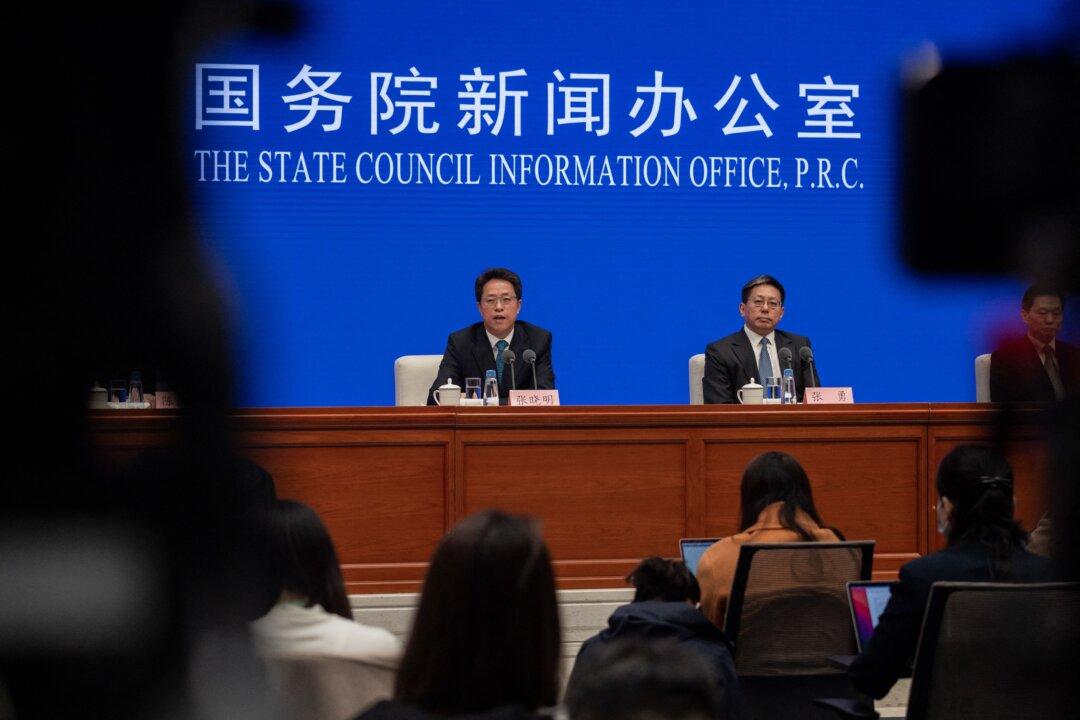A popular Chinese commentator recently introduced the spiritual exercise and meditation practice Falun Gong on his YouTube channel, helping to raise awareness about the Chinese Communist Party’s (CCP) persecution in China, which is still a taboo topic among Chinese diaspora today.
Since July 1999, hundreds of thousands of adherents have been thrown into prisons, labor camps, and brainwashing centers amid the atheist Chinese regime’s sweeping persecution campaign.
Lao Hei, is a Chinese expat currently living in Spain. He has a large following on his YouTube channel “We Media” where he discusses current affairs.
He told The Epoch Times in a recent interview that he knew a little about the practice when he was in junior high school in China, but learned more after then-CCP leader Jiang Zemin ordered a nationwide persecution of Falun Gong.
At the time, the Chinese regime deployed its media outlets to spread hate propaganda vilifying the practice and its adherents, in an effort to justify its persecution.
“At that time, I was studying at a university in Beijing. Whether it was on TV or in the newspapers, there was a lot of talk about Falun Gong being bad. When everyone was talking about Falun Gong, I felt that something was wrong. Falun Gong didn’t provoke anyone. Why did they keep talking about it every day? Falun Gong had not harmed my family nor myself. Why should I believe what the news broadcast said?”
He recalled walking with his classmates one day, and they were also saying something negative about Falun Gong. “Suddenly I couldn’t take it anymore, and I asked them, ‘How did Falun Gong harm you?’ Then I shouted, ‘Long live Falun Gong! Come and get me!’ That’s all I said. After that, my classmates kept more than five meters away from me out of fear of being implicated. That tells you how deep the fear of the CCP runs. This is my personal experience.”
After he graduated from university and worked for a few years, Lao said he started to come into contact with some Falun Gong practitioners in his daily life. They often talked to him about what Falun Gong is, and the ongoing persecution.
“Once I went shopping in a shopping center and sat down to rest in the square when I was tired. An old lady came over to chat with me, saying their practice is cultivation, improving one’s health, and following truthfulness, compassion, forbearance. They are always very gentle, kind, and courteous. My first impression in the early years was that Falun Gong practitioners are harmless.”
But an incident in 2012 gave Lao a deeper understanding about Falun Gong.
Several Falun Gong practitioners messaged him on WeChat, a popular social media platform, and told him about the current persecution and the Chinese regime’s false propaganda about the practice. Lao said, “One time, a netizen began to curse Falun Gong [on WeChat]. His abuse was particularly nasty, but I found that these Falun Gong practitioners were humble [when responding to the netizen]. They were able to control their emotions from beginning to end. As an observer, I thought that people with certain qualities can always stay rational and be able to endure abuse. It was at that time my opinion of Falun Gong changed.”
Another incident left a deep impression on Lao about Falun Gong. He said that he once opened an online payment account, and wanted to make sure that it could receive money. So he asked people in his social media group to deposit a small amount into the account to see if it was working.
“After a few days, there were no responses at all. On the contrary, a Falun Gong friend whom I never met in person transferred two funds to me, $5 and $8 (U.S. dollars). This is a small thing, but it was very touching to me. Because money is a sensitive issue, as soon as people are asked to pay, they will immediately close off themselves. However, this Falun Gong friend wanted to help me. I felt he was very upright. He took this small matter to heart. It wasn’t about the amount of money, but his actions showed that he cared. So I felt that Falun Gong practitioners are actually helping people, rather than just saying it. I won’t go into details of many other things like this. I feel Falun Gong practitioners are different from ordinary Chinese people.”
After several years, Lao has met many more Falun Gong practitioners in real life.
“[I] feel they are all good people. As I said before in my program, Falun Gong practitioners never do harm. Even though I don’t practice Falun Gong myself, I would tell people not to be malicious towards Falun Gong. They are all good people.”
In 2019, Lao Hei released three videos introducing Falun Gong on his YouTube channel.
The first one is titled, “I don’t practice Falun Gong, but I hope people can stop misunderstanding Falun Gong. They are all good people.”
Another is titled, “Interview with a Falun Gong practitioner who was repeatedly detained. Listen to her speak about the horrors of detention.”
And the last one is titled, “Let’s talk about Falun Gong again: 1. Never quarrel; 2. Concentrate on spreading the truth; 3. Never harm anyone. No group can match them on these three points!”
Lao Hei’s programs have attracted the attention of many Chinese netizens. Netizen Li Mengyuan said, “Never quarreling is forbearance; concentrating on spreading the truth is truthfulness; never harming anyone is compassion. Falun Gong students use their actions to exemplify their spiritual beliefs.”
Netizen Jessie Zou posted, “When I was studying abroad in Germany, I also saw a Falun Gong booth on the streets. Back then, I felt they were ridiculous. After all, we were all raised in such an [prejudiced] environment. However, since the outbreak of the Wuhan pneumonia [CCP virus, commonly known as novel coronavirus], I became eager for news from the outside world. People should have freedom of belief, and to be able to keep one’s conscience. Patriotism is not equal to blind ignorance. Perhaps we should reflect on ourselves ... I would like to have more contact with Falun Gong people when I study abroad in the future.”
Netizen Jian Bai8 said: “Attaboy Lao Hei! You have the courage to report about Falun Gong!”
Lao Hei said he created these programs so people could fully understand Falun Gong. He said, “They (Falun Gong practitioners) are always misunderstood by others. I have some Falun Gong friends here [in Spain] as well. They walk down the street every week to hand out leaflets, to spread information. Yet they’re expelled by some businesses who do not know the truth. They curse them as anti-communist or anti-China. I feel that Falun Gong practitioners have to endure too much. They endure too much for [for the sake of their belief in] forbearance.”
‘May Falun Gong Lead Humanity Back to Goodness’
Lao believes the CCP fears that a highly self-disciplined group like Falun Gong could subvert the rule of its regime, and as a result, chose to persecute Falun Gong adherents.In the process of cracking down on goodness, the CCP is turning China into a society where everyone hurts each other, he said.
“The degree to which Chinese people harm others is like, even though you have no grudge against them, they will kill you if you try to hurt them,” he said on his YouTube program.
Lao Hei shared his vision: “I hope Falun Gong can lead humanity back to true goodness.”




